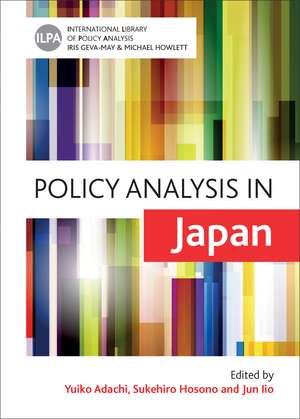Policy Analysis in Japan: International Library of Policy Analysis
Editat de Yuiko Adachi, Sukehiro Hosono, Jun Iioen Limba Engleză Hardback – 27 ian 2015
In this new installment in Policy Press’s successful International Library of Policy Analysis series, Japanese scholars offer for the first time a detailed examination of the theory and practice of policy analysis systems in Japan. Together they make expert assessments of the extent to which the Japanese government has provided key policy actors with evidence-informed policy options and, thereby, improved the likelihood of better policies being adopted and implemented. Policy Analysis in Japan also assesses Japan’s future policy directions, allowing policy researchers and practitioners to draw a number of lessons from the Japanese experience. Featuring empirical case studies to aid teaching and further research, this collection will be a valuable resource for students, academics, and policy makers.
Preț: 1085.42 lei
Preț vechi: 1409.63 lei
-23% Nou
Puncte Express: 1628
Preț estimativ în valută:
207.79€ • 216.81$ • 174.18£
207.79€ • 216.81$ • 174.18£
Carte tipărită la comandă
Livrare economică 12-26 martie
Preluare comenzi: 021 569.72.76
Specificații
ISBN-13: 9781847429841
ISBN-10: 184742984X
Pagini: 352
Dimensiuni: 171 x 241 x 23 mm
Greutate: 0.73 kg
Editura: Bristol University Press
Colecția Policy Press
Seria International Library of Policy Analysis
ISBN-10: 184742984X
Pagini: 352
Dimensiuni: 171 x 241 x 23 mm
Greutate: 0.73 kg
Editura: Bristol University Press
Colecția Policy Press
Seria International Library of Policy Analysis
Notă biografică
Yuiko Adachi is professor emeritus at Kyoto University and professor of public policy at Kyoto Industrial University, Japan. Sukehiro Hosono is dean of the Graduate School of Public Policy and professor of policy analysis and economics at Chuo University, Japan, and the president of the Japan Association of Planning and Public Management. He serves on the advisory committees of the Ministry of Finance, Japan. Jun Iio is professor of political science at the National Graduate Institute for Policy Studies, Japan. He has served on various advisory committees of Japanese government.
Cuprins
Introduction
Policy Analysis in Japan: The State of the Art ~ Yukio Adachi
Part I: Styles and Methods of Policy Analysis in Japan
Historical Background of Policy Analysis in Japan ~ Jun Iio
Beyond a Formal Approach?: Seeking Adequate Policy Analysis in Japan ~ Sukehiro Hosono
Policy Research Movement in Local Governments ~ Kimie Tsuchiyama' Policy Analysis and Normative Theory: With a Focus on Social Security Policies ~ Wataru Sano
Law and public policy in contemporary Japan ~ Makoto Usami
Part II: Policy Analysis in Japanese Governments
Policy Analysis and Policy Process in Japanese Government ~ Jun Iio
In-House Think Tanks of Ministries: Their Functions and Limitations in Policy Formulation ~ Hideaki Tanaka
A Policy Analysis of the Japanese Diet from the Perspective of ‘Legislative Supporting Agencies’
~ Jun Makita
Councils, Policy Analysis and Policy Evaluation ~ Kiyoshi Yamaya
Local Governments and Policy Analysis in Japan after World War II ~ Toshiyuki Kanai
Part III: Parties, Interest Group, Advocacy-Based Policy Analysis
Policy Analysis and Policymaking by Japanese Political Parties ~ Takahiro Suzuki
Business Associations and Labor Unions ~ Takao Akiyoshi
Current State of NPOs and the “New Public Commons”
~ Takafumi Tanaka
Think Tanks and Policy Analysis: Meeting the Challenges of Think ~ Tanks in Japan ~ Mika Shimizu
Policy Analysis in the Mass Media ~ Hirotsugu Koike
Part IV: Future Directions of Policy Analysis in Japan
Policy Education in Japan: A Study of Professional Graduate Public Policy Schools ~ Koichiro Agata
Job Market for Public Policy Program Graduates in Japan ~ Satoshi P. Watanabe
Conclusion: Future Directions of the Theory and Practice of Public Policy Analysis in Japan ~ Yukio Adachi.
Policy Analysis in Japan: The State of the Art ~ Yukio Adachi
Part I: Styles and Methods of Policy Analysis in Japan
Historical Background of Policy Analysis in Japan ~ Jun Iio
Beyond a Formal Approach?: Seeking Adequate Policy Analysis in Japan ~ Sukehiro Hosono
Policy Research Movement in Local Governments ~ Kimie Tsuchiyama' Policy Analysis and Normative Theory: With a Focus on Social Security Policies ~ Wataru Sano
Law and public policy in contemporary Japan ~ Makoto Usami
Part II: Policy Analysis in Japanese Governments
Policy Analysis and Policy Process in Japanese Government ~ Jun Iio
In-House Think Tanks of Ministries: Their Functions and Limitations in Policy Formulation ~ Hideaki Tanaka
A Policy Analysis of the Japanese Diet from the Perspective of ‘Legislative Supporting Agencies’
~ Jun Makita
Councils, Policy Analysis and Policy Evaluation ~ Kiyoshi Yamaya
Local Governments and Policy Analysis in Japan after World War II ~ Toshiyuki Kanai
Part III: Parties, Interest Group, Advocacy-Based Policy Analysis
Policy Analysis and Policymaking by Japanese Political Parties ~ Takahiro Suzuki
Business Associations and Labor Unions ~ Takao Akiyoshi
Current State of NPOs and the “New Public Commons”
~ Takafumi Tanaka
Think Tanks and Policy Analysis: Meeting the Challenges of Think ~ Tanks in Japan ~ Mika Shimizu
Policy Analysis in the Mass Media ~ Hirotsugu Koike
Part IV: Future Directions of Policy Analysis in Japan
Policy Education in Japan: A Study of Professional Graduate Public Policy Schools ~ Koichiro Agata
Job Market for Public Policy Program Graduates in Japan ~ Satoshi P. Watanabe
Conclusion: Future Directions of the Theory and Practice of Public Policy Analysis in Japan ~ Yukio Adachi.
Recenzii
“Ministries with professional bureaucracies and dedicated think tanks undoubtedly contributed to Japanese postwar development. The distinguished editors of this volume make a strong case that Japanese public policy would now benefit from both increased policy analysis capability within the ministries and greater participation from policy analysts in the broader society.”
“This book of essays on Japan is an especially important contribution to the study of comparative policy analysis, allowing policy scholars to understand the evolution of the field in Japan, but also to focus on the ways in which policy knowledge and practices travel.”
“A marvelous work, introducing readers to their terra incognita of Japanese public policy analysis. The beauty of the volume is the comprehensive and concise coverage of concepts, methods, and substantive topics of public policy analysis as practiced in Japan. A must-read for public policy analysts and laymen alike.”
“An excellent academic book that should be read deeply, thoroughly, and comprehensively in order to understand policy making in Japan.”




















